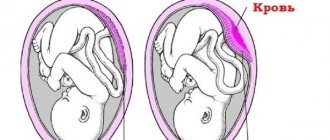Body changes and new sensations for women
At week 19, many women experience back pain during pregnancy. This is one of the most common ailments that can await an expectant mother during the months of waiting for her baby. The reasons for its appearance are understandable: during the period of “interesting position,” the femoral-sacral joints, which are usually motionless, begin to relax under the influence of the hormone relaxin in order to facilitate the movement of the fetus along the birth canal. Relaxed joints, as well as an enlarged abdomen, disrupt the balance in the body, increasing the load on the spine. Hence the pain and discomfort in the lumbar region. What do doctors advise women who have back pain during pregnancy? You need to sit down, relax, massage the sore spot. You can also use special ointments, but they should be selected very carefully - the preparations should not contain poisons or irritants. If the pain persists for a long time, consult a doctor.
What changes in the mother's body
The rate of weight gain in the nineteenth week is from 3 to 5.5 kg. During this time of active growth of the baby, the mother may develop an uncontrollable feeling of hunger, and she literally eats everything she sees. Try to control yourself, since overeating is a risk factor for the development of late toxicosis, or gestosis, and this condition can be quite dangerous.
Also, excess food consumption can lead to the development of heartburn, which is accompanied by increased acidity of gastric juice, bloating and colic. The latter can sometimes be confused with uterine contractions.
During this period, endocrine disorders may occur in a woman’s body, in particular, the thyroid gland increases in size. Accordingly, the production of hormones increases, which leads to the development of thyrotoxicosis. Its main features are:
- Sweating, feeling hot;
- Heartbeat;
- Increased nervousness;
- Vomiting and nausea;
- Enlargement of the eyeballs, which protrude somewhat from their sockets.
Since these signs can also be observed during normal pregnancy, it can be difficult to make a diagnosis. Delayed treatment sometimes leads to disruption of the baby's development, so if you suspect a pathology, it is better to play it safe and take a blood test to check hormone levels.
At the nineteenth week of pregnancy, the uterus is already significant in size and puts pressure not only on adjacent organs, but also on blood vessels, complicating venous outflow. This can lead to the development or worsening of varicose veins. As a rule, the area of the legs, external genitalia and anus is affected. Hemorrhoids in pregnant women are external, when the nodes are located outside the intestine, and internal, if the veins are dilated in the rectal area. This disease requires consultation with a proctologist, as it can cause a lot of trouble, ranging from constant pain to secondary infection.
The pregnancy is about to reach its equator, so the expectant mother can take some intermediate results. The very first anxious months of bearing a baby are already behind us, but in the near future there will be a rather difficult and responsible period when a woman will experience physical discomfort due to a large belly.
- Fetal growth and development
- Changes in a woman's body
- Analyzes and examinations
- Possible dangers at 19 weeks of pregnancy
- Recommendations
19th week of pregnancy
In the meantime, you can rest a little, because the 19th week of pregnancy is almost the middle of the second trimester, which is a fairly comfortable time.
Taking advantage of this opportunity, the expectant mother can go shopping and update her wardrobe, visit relatives or friends, and relax in nature. But it should be remembered that any unfavorable factors can be dangerous for a developing fetus, including poor-quality food, hypothermia or overheating, so reasonable care must be taken in everything.
- Calculation of due date
- Chinese calendar for determining the gender of a child
- Calculation of the sex of the child by blood renewal
- Ovulation calculator
- Weight gain during pregnancy
- Pregnancy calculator
Mom's belly
The size of the belly at 19 weeks often causes some inconvenience, primarily related to sleep - it becomes increasingly difficult for mom to find a comfortable position to get a good night's sleep. According to doctors, pregnant women should sleep on their left side (the uterus in this position does not exert much pressure on the woman’s internal organs). And for complete comfort, the expectant mother can place a bolster or pillow between her legs.
We also note that the size of the tummy at this stage can be very different: for some it is barely noticeable, while for others it is quite impressive in size. This is absolutely normal! If a woman is pregnant for the first time, her belly usually grows more slowly.
Visiting an obstetrician-gynecologist
At the 19th obstetric week of pregnancy, some women may have another appointment with a gynecologist. On the eve of the meeting, it is necessary to take a urine and blood test (directions were issued at the last appearance).
At the appointment, the gynecologist will take measurements:
- blood pressure;
- body temperature;
- weight;
- abdominal circumference.
Additionally, an examination will be carried out in a chair, the fetal heartbeat will be listened to through a stethoscope, and a survey will be conducted about changes in the woman’s sensations.
During the appointment, it is advisable to tell the doctor about all new sensations and symptoms that cause anxiety. A list of questions compiled in advance will help you not to forget about important things.
During the appointment, the doctor can set a date for the 2nd screening (ultrasound and triple test (if indicated), and will issue a referral for a urine and blood test (if necessary).
Ultrasound and tests
Visiting the doctor at 19 weeks
At the 19th obstetric week of pregnancy, a 2nd planned ultrasound can be performed to identify possible pathologies in the fetus. It is also possible to receive a referral to take a “triple test” (blood test) to identify the likelihood of genetic abnormalities. If the dynamics are positive, there are no medical indications, and a good result of the “triple test” done earlier, the doctor can only prescribe an ultrasound .
The 2nd planned ultrasound allows the doctor to examine the condition of the fetus and uterus, and compare the indicators with the norms for the term. During the procedure, the doctor examines:
- main parameters of the fetus: head circumference (HC), length of the femur (HB) and humerus (HB), width of the head from temple to temple (BPR).
- the condition of the internal organs of the fetus, the correspondence of maturity and size to the gestational age;
- condition of the skeleton of the unborn child, compliance of the parameter with the deadline;
- location of the fetus in the uterus, place of attachment of the umbilical cord, location of the placenta;
- volume of amniotic fluid.
Based on these data, conclusions can be drawn about the timeliness of the development of all major organs and systems of the unborn child, and the favorable course of pregnancy. If questions arise on any of the indicated points, the doctor may suggest that the woman undergo additional tests.
At the current stage, the ultrasound specialist can determine the sex of the unborn baby. The probability of error is minimal.
A triple test at the 19th week of pregnancy (if prescribed by a doctor) is done to identify the likelihood of congenital diseases. The following levels are measured in the blood of a pregnant woman:
- hCG;
- free estriol;
- alpha-fetoprotein.
The result obtained is not a 100% guarantee of the occurrence of a particular genetic abnormality, but it does identify possible risks. If an undesirable result appears, the doctor may prescribe an additional study (cordocentesis, amniocentesis, etc.). It is the woman’s decision to agree to the study or not. Any invasive procedure has a small but risk of complications.
Uterus and belly
At the 19th week of pregnancy, the uterus continues to increase in size and rise upward. At the current stage, the fundus of the uterus is 1-2 cm below the navel.
The belly can no longer be hidden under loose clothing; it protrudes well. When a woman lies on her back, the location of the fetus in the uterus is clearly visible.
This week, a woman should wear loose or special maternity clothing to prevent pressure on the abdomen. It is recommended to choose shoes only with low speed. High wedges or heels can not only cause additional pain in the legs, but also affect the health of the spine, which is already subject to additional stress.
Pain in the abdomen and other parts of the body
At the 19th week of pregnancy, pain may appear in different parts of the body. A woman needs to navigate the possible causes of their occurrence in order to promptly take the necessary measures to reduce the intensity of pain, make changes to the daily routine, and timely consultation with a gynecologist.
Stomach ache
At this stage of pregnancy, pain in the abdomen can be caused by various reasons. Depending on their nature, appropriate decisions must be made.
- single abdominal pain, accompanied by tension across the entire surface of the abdomen. Most often, this is how the tone of the uterus manifests itself. Most often, this symptom appears after physical activity or stress. In such a situation, you need to lie down and relax. If the pain has stopped and does not recur, you should try to avoid the situations that caused the symptom in the future;
- frequent abdominal pain, accompanied by tension across the entire surface of the abdomen. Frequent or constant uterine tone is the reason for urgent consultation with a gynecologist;
- severe, increasing pain in the abdomen: cramping, intensifying when pressed, accompanied by bloody or brown discharge, fever above 37.5 degrees Celsius. If these symptoms occur, you should immediately seek medical help.
- pain in the right or left side, with an incorrect sitting position, sudden movement while standing. Most often, pain on one side caused by a sudden movement or incorrect body position is caused by excessive tension in the abdominal muscles. If the pain intensity quickly decreases after taking an even position, this symptom does not require treatment. It is recommended to wear a prenatal bandage.
Back pain
The 19th week of pregnancy is characterized by the appearance of unpleasant sensations and back pain. Most often, unpleasant sensations appear in the late afternoon, in the lumbar region. The appearance of this symptom is associated with a shift in the center of gravity due to increased weight and a larger abdomen. Wearing a prenatal bandage will help reduce the intensity of symptoms.
If the back pain is shooting, aching on the right or left, accompanied by abdominal tension, a consultation with a gynecologist is necessary.
Leg pain
Pain in the legs can be caused by various reasons. Those that do not go away after a night's sleep or daytime rest require special attention. The search for the causes of pain should be carried out by a gynecologist, based on the tests of the pregnant woman.
Headache
The appearance of headaches in the 19th week of pregnancy is a reason to consult a doctor. Before taking it during an attack of pain, it is necessary to measure blood pressure.
Discharge
Normally, discharge at this stage of pregnancy should be light in color and without a strong odor. The amount of discharge may increase. A reason to see a doctor is any change in color, consistency or smell.
If a pregnant woman feels that the discharge has become more watery, but there are no changes in color or odor, she should consult a gynecologist.
Bleeding and menstruation
Normally, there should be no bleeding or menstruation at the 19th obstetric week of pregnancy. If any red or brown discharge appears, you should immediately seek medical help.
Tests and ultrasound
At week 19, you can still do a second planned ultrasound during pregnancy (doctors will check the development of the fetus, its size, possible anomalies, the condition of the umbilical cord and placenta).
An ultrasound will also show who “lives” inside the mother - a boy or a girl. Gender determination may be incorrect: for example, little princesses often experience intrauterine swelling of the labia, which is mistaken for the scrotum. At the same time, women undergo tests for hormones (usually for medical reasons), general urine tests (the results determine the condition of the kidneys, the presence of parasites, salts, proteins and other undesirable elements in the body), blood (to identify, for example, anemia during pregnancy).
What's happening to the baby?
At 19 weeks of pregnancy, the size of the fetus reaches 25-27 cm in length. The child is gaining weight: now he will gain 100 g every 7 days; Now the baby weighs a little more than 400 g.
The main organs and systems of the fetus are formed and continue to develop, the child is able to taste amniotic fluid, respond to sounds and bright flashes of light, and skin sensitivity increases. The bone apparatus and muscle tissue are actively developing, the mineralization of baby teeth and the formation of permanent teeth occur, which is why the baby especially needs calcium, in case of a deficiency of which the fetus will begin to “get” it from the woman’s body. Therefore, yoghurts and other fermented milk products, nuts, herbs, vegetables and fruits are now a priority; if necessary, the doctor will prescribe you an additional multivitamin.
To prevent pathological development of the child, increased uterine tone, or even premature birth, you need to visit the dentist if you have not already done so. The fact is that untreated caries of your teeth can significantly spoil the quality of life and well-being of the mother, and cariogenic bacteria, entering the gastrointestinal tract and blood during food, can cause opening of the cervical canal and destruction of the membranes.
Phases begin to be observed in the child’s daily routine: shorter periods of wakefulness are replaced by longer periods of sleep. At the 19th week of pregnancy, the mother feels the first manifestations of her baby’s character: some children are active, roll over, interact with the wall of the uterus, others are calm and sedentary.
Sometimes on an ultrasound you can see the fetus sucking its finger. There is an assumption: by which hand the child holds to his mouth, already at 19 weeks of pregnancy it is possible to determine whether he is right-handed or left-handed. However, scientists have different opinions. According to some neuropsychologists, left-handedness is detected after birth by the position of the baby's arms in a supine position: the right one is pressed to the chest, the left one is extended forward. Others believe that the dominant hand is finally designated only at 3 years of age, and until then it can change repeatedly. The type of brain activity does not always correspond to the control of one or another hand. There are almost no adults who are right-handed or left-handed in their pure form, since even with the dominant left hand, the right eye, ear or leg can be dominant. Left-handedness, caused by a genetic factor, can be inherited.
Nutrition at 19 weeks of pregnancy
At any given week, proper nutrition during pregnancy means fresh, high-quality natural food without preservatives or processed foods. Can pregnant women eat rolls and sushi? This question is very often asked by pregnant women, since dishes of traditional Japanese cuisine are no longer considered exotic in Russia; they have become firmly established in our diet and have become favorites for many. Remember: expectant mothers should not eat raw fish and meat - the risk of contracting infectious diseases and parasites is extremely high. In addition, when preparing dishes in a restaurant, basic sanitary and hygienic standards may not be observed, which is also fraught with various negative consequences. Doctors, therefore, do not recommend that expectant mothers take risks and advise eating only proven homemade food.
Sex at 19 weeks pregnant
At week 19, when the presence of the baby becomes more obvious (many mothers could already feel the baby’s first movements), some men begin to refuse intimacy, fearing not only harm to the baby, but also because of a strange prejudice that the baby will become a “witness” of love affairs. parents' fantasies. Nothing like this can happen! Rough sex and sexual toys, of course, should be abandoned, but otherwise you can leave everything as it was before pregnancy (if the woman is healthy and has no medical contraindications to the physical expression of love). The child will not have any “memories” of mom and dad having sex.
Fetus. Development at 19 weeks
Fetal development at 19 weeks
At the 19th obstetric week of pregnancy, the fetus reaches a length of about 20 cm (from the back of the head to the heels), weighing about 250 g. To visualize the size of the unborn baby, you can imagine a large potato.
The processes of development and maturation of internal systems and organs continue, the future baby becomes more and more like an ordinary person. Many systems (gastrointestinal, cardiovascular, nervous) are already working, training their capabilities, in some the process of development continues (pulmonary, immune).
The nervous system is the basis of any organism; at the current stage it performs many functions, although its development is not yet complete. In the brain, the cortex is actively growing and convolutions are forming. Thanks to this process, in the future the fetus will have higher mental activity, will be able to learn and perform complex mental operations. The convolutions are formed as a result of the fusion of many grooves that have formed on the cerebral cortex over the previous few weeks.
At the current stage of development, connections between neurons are built in the brain, the ability to conduct signals between different nerve endings is honed, and the ability to control various parts of the body is trained. The process of myelination of neurons continues, ensuring an increase in the conductivity of nerve endings. At the 19th week of pregnancy, fetal movements, which were previously chaotic, gradually become more orderly and are controlled by commands from the center of the nervous system (brain).
The development of the main sense organs continues. In the next 7 days, the formation of visual analyzers will be completed. While the baby cannot yet see and perceive his surroundings, he will very soon begin to raise and lower his eyelids. The formation of vision and perception of the environment is a long process that will continue throughout pregnancy and after birth.
Hearing improves; the future baby may flinch if there is a loud sound or music playing near the mother. For now, the sounds coming to the baby are muffled. After birth, the baby will have to get used to distinguishing between the sounds of individual objects and natural sounds for some time.
The tactile capabilities of the fetus continue to develop. Now he can already feel a touch on the uterus and, obeying reflexes, push away from it. The expectant mother can definitely feel the strongest tremors. Very soon the fetus will become larger, stronger, and the woman will be able to clearly hear how the unborn baby moves.
The fetal face has already formed, all the main organs are in place. Milk and molar teeth continue to form, located in the depths of the jaws, one under the other. To ensure the future child has healthy and beautiful teeth, it is necessary to carefully control the intake of sufficient calcium into the mother’s body.
The process of replacing cartilage tissue with bone tissue is in full swing. The baby already has about 200 bones, but by birth their number will increase to 270. The muscles around the hardening bones actively train, increasing in volume. The most developed muscles at this stage are the neck muscles. They allow the fetus to actively move its head, looking for the most comfortable position.
Internal systems are actively mastering basic functions. The gastrointestinal tract is formed, trying to process amniotic fluid (amniotic fluid) accidentally swallowed by the fetus. Juice is produced in the stomach, and meconium (original feces) is formed in the intestines. The kidneys actively filter the blood and continue to mature.
The fetus pees in the amniotic fluid, but do not worry that the unborn baby is surrounded by his own urine. Amniotic fluid is constantly replaced, cleaned and removed from the body of the expectant mother. To prevent the delicate skin of the fetus from coming into contact with amniotic fluid, its body has vernix lubrication produced by the sweat glands.
Vernix lubrication is an important element that allows you to regulate the body temperature of the fetus and protect the skin from harmful effects. It will help the future baby to be born and gradually disappear completely. Immediately after birth, the main part will be erased by obstetricians, and the mother will only have to gradually get rid of the remnants on the scalp (crusts).
The vernix is retained on the baby's body by fine hairs (lanugo). This light fuzz will disappear after birth, but at this time it allows hair follicles to develop.
The skin of the fetus at the 19th week of pregnancy is red and wrinkled, there are still many folds on it. The skin is already 4-layered; underneath it, brown fat is actively forming. This type of fat will help your newborn baby stay warm while he sleeps a lot and eats little.
In the respiratory system of the fetus, the most important elements are actively developing. The bronchi continue to enlarge, gradually becoming like trees with numerous branches. Lungs begin to form. The muscles responsible for the movement of the sternum are actively trained, rising and falling slightly.
Future girls at this stage have already formed about 6 million eggs in their ovaries, but their number will decrease by ⅔ by birth.
At the 19th obstetric week of pregnancy, despite the working systems, the fetus cannot yet survive without the mother’s body. A woman should be attentive to her feelings and strive to provide the fetus with all the necessary elements for development.










